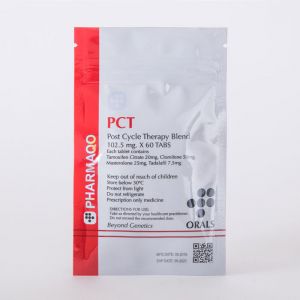


This composite formulation unites four agents with distinct but complementary roles in hormonal modulation and performance restoration. Tamoxifen and Clomiphene, both SERMs developed in the 1960s–70s, stimulate endogenous testosterone through hypothalamic feedback. Proviron, a DHT-based androgen introduced in the 1930s by Schering, supports libido and SHBG displacement. Tadalafil, approved in 2003, enhances vascular response. Together, they form a multi-pathway compound aimed at post-cycle recovery and androgen support .
Llewellyn, W. (2017). William Llewellyn's Anabolics.
United States: Molecular Nutrition, LLC.
Coward, R.M. & Carson, C.C., 2008. Tadalafil in the treatment of erectile dysfunction. Therapeutics and Clinical Risk Management.
Disclaimer: Information provided it this page is for general information only and does not substitute for professional medical advice.
For detailed information about PCT 102.5 by Pharmacom Labs, consult with your doctor or healthcare professional.


Llewellyn, W. (2017). William Llewellyn's Anabolics.
United States: Molecular Nutrition, LLC.

Coward, R.M. & Carson, C.C., 2008. Tadalafil in the treatment of erectile dysfunction. Therapeutics and Clinical Risk Management.

Llewellyn, W. (2017). William Llewellyn's Anabolics.
United States: Molecular Nutrition, LLC.